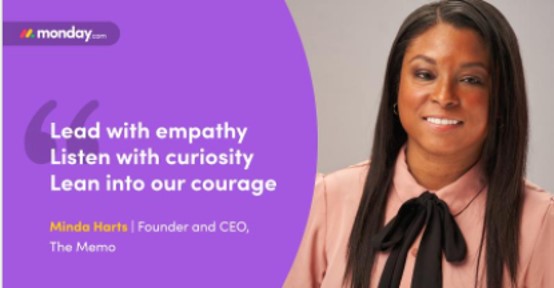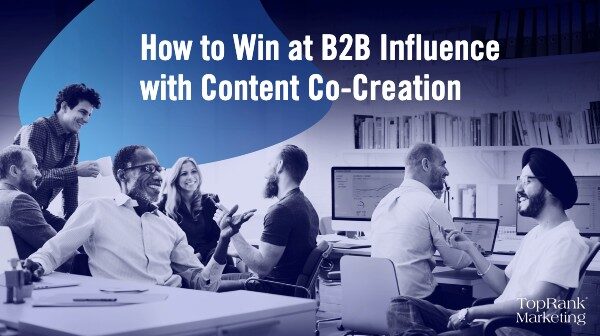Today we live in an age of information overload where the speed of content discovery and the variety of options for media consumption across connected devices presents new challenges for B2B brands and buyers alike.
The natural response for buyers is to filter their choices and focus those few sources which are most trusted, credible and meaningful. For brands that want to differentiate and even dominate in their category, becoming known as “the best answer” for their domain of expertise will have enormous impact.
The challenge of increased digital sophistication brings an opportunity: businesses can differentiate and capture market attention by growing their authority and influence.
Content is a top priority for brands.
Numerous research studies continue to support the fact that content marketing is a top priority for marketers but there are also some challenges; companies find it difficult to produce enough content, as well as create content that engages and has enough variety.
Even when companies are able to produce high quality, relevant content on a regular basis, the challenge of distribution and reach is a concern for many. Part of the solution is to connect B2B content creation efforts with internal and industry influencers that already have communities they engage with on the same topics.
Influencer content and authority.
Brands aren’t the only non-traditional online publishers. Subject matter experts are also able to publish through social networks and media, blogs and increasingly easy contributions to online publications. Besides creating topically competitive content, SME publishing has empowered individuals to attract their own audiences and become as influential as the some of the companies they buy from.
In addition to working with established influencers, brands can nurture future influencers to create a more effective brand community that exponentially scales reach and engagement.
The shock of content proliferation.
As a result of the content explosion, brands are faced with the reality that the majority of the content they produce might never be discovered or engaged. At the same time, brands must recognize their customers are becoming more influential about the same topics brands are spending advertising and marketing budgets on.
When business customers are empowered to create, consume, publish, interact and transact anytime, anywhere, how do brands break through to create meaningful connections and engagement? How does the dynamic of content and influence help fulfill buyer information discovery, consumption and engagement expectations while delivering on business outcomes for the brand?
As a vehicle for influence, content is one of the most powerful tools in a digital marketer’s mix to attract, engage and inspire buyers to act.
“Content co-creation is the currency for building relationships that can boost credibility, influence and action.”
The B2B content + influence solution.
A business content and influencer marketing strategy can be one of the most effective combinations B2B marketers can make. By incorporating relevant influencers that can inspire action with content marketing efforts, marketers can reach new audiences with brand messages that are credible and trusted.
Influencer driven content marketing is also one of the best examples of how digital marketing and public relations are converging. The integration of messaging, content, social media and engagement right along with the promotion of information and media designed to inspire transactions should be the focus of any business that wants to differentiate and grow.
Buyers trust influential experts.
The 2020 State of B2B Influencer Marketing Research Report reveals that 77% of B2B marketers believe their prospects rely on advice from industry influencers. Additionally, 84% trust influencers to create brand awareness and 69% count on influencers to help generate new leads.
While B2B content marketing on its own is effective, working with influential experts to co-create content is an approach that yields surprising results.

Influencer content gets results.
When the pandemic swept through the world in early 2020, monday.com identified an opportunity to help support teams that had gone from working in-office to working remotely.
As a provider of remote project management software this transition created an opportunity for our client monday.com to position itself as a valuable resource for remote teams. Monday.com partnered with TopRank Marketing to develop an influencer marketing campaign featuring industry experts that could reach and engage remote work teams more effectively than the brand on its own.
Seasoned experts and influencers in the remote work space were engaged to collaborate on and promote content published on the brand site, on the influencers own sites, brand social channels and via livestream.
By engaging influencers with audiences hungry for information about remote work best practices, this campaign added value to the target audience and increased awareness of monday.com’s offering with impressive results:
- 17.9M in potential reach from brand mentions by influencers (goal was 1M)
- Over 300K organic impressions on social media
- Nearly 3k video views of a live stream featuring two industry experts within the first week
See the full Monday.com influencer marketing case study here.
By connecting with market and niche influencers and working with them to achieve mutually beneficial goals, modern marketers can create invaluable relationships with authoritative experts. These connections can result in the creation of high quality, relevant and authoritative content that serves the interests of the influencer and the brand as well as providing access and reach to the influencer’s community.
B2B influencers are credible, authoritative individuals who have an engaged community that follows and acts on their thought leadership.
Winning at B2B Influencer Marketing means working with influencers to affect change in thought and action amongst a network towards goals that are mutually beneficial to the brand, the influencer and their community. Whether it is a partnership to co-create content or more general advocacy, business influencers open doors for brands to connect with engaged buyers they might otherwise never reach in a meaningful way.
“Everyone is influential about something.”
B2B influencers can be industry professionals, they could also be inside a company as subject matter experts or a company’s own customers. Influencer relationships with brands often include a value exchange of some kind and it’s up to the company and influencer to decide whether that’s an exchange of information, visibility, compensation or something else.
The essential questions of B2B influencer content.
To be effective when working with business influencers, B2B brands need to consider what they want the influencer to do for them beyond a simple endorsement.
- How will the influencer’s involvement help the company reach a particular business goal?
- What will an ongoing relationship with influencers mean to the brand’s marketing efforts and reputation in the industry?
- Also, what kind of content does it make the most sense for the influencer to contribute to?
- How does the brand want to be known and which influencers already have that credibility and authority?
These questions and more will be answered in the following model for B2B influencer content co-creation.
6 best practices for working with and influencing B2B influencers to co-create content:
- Identify Influencer Program Goals
- Research, Engage and Recruit Influencers
- Develop Co-Created Content with Influencers
- Inspire Content Promotion
- Influencer Measurement and Program Optimization
- Ongoing Influencer Relationships
1. Identify Influencer Program Goals – Serving different audiences (influencers, brand, prospects, industry media) requires a strategy that identifies distinct goals. While most subject matter experts and influencers desire increased visibility, B2B brands will want to grow their expertise for a topic amongst a target audience and attract new business. Consumers of the influencer content will want expert information from someone they trust. Industry news media will want examples they can reference and subject matter experts they can cite.
Just starting out, co-created influencer content can be as simple as a value exchange: increased exposure for both the influencer and the brand with the objective of attracting new target audience engagement and influencing a spectrum of conversion actions: subscribe, download, register, request information.
As an influencer content program matures, goals can become more sophisticated and multi-faceted to include public relations, recruiting, customer marketing and more advanced customer acquisition.
B2B influencer content programs should be tied into the content marketing plan and editorial calendar. An important part of designing an effective influencer content program is to identify the specific topics to be covered. Specifying topics and themes will drive all subsequent actions in the program from influencer recruiting to planning which media type to create to content promotion.
2. Research, Engage and Recruit Influencers – It’s important to identify the key themes that represent topical focus for the brand, the product or service and the campaign or program that you will creating with influencers. The sooner your company specifies these topical areas of focus, the sooner influencers can be identified and engaged.
“The time to start recruiting influencers is long before you need them. Romance takes time.”
It can be useful to start influencer identification by brainstorming with executives, marketing, communications and product managers to develop a list of known topical experts and even nominations of specific individual influencers. However, subjective measures like these bring heavy bias. It is always a good idea to validate influencer recommendations using data about topical relevance, resonance of that topic with the influencer’s audience and the their network size. There are many influencer marketing platforms which can provide the data needed to properly filter which individuals are perceived as influential by the communities that listen to them.
Influencer sourcing and engagement takes time. Many influencer co-created content projects will draw from both existing influencer relationships and involve making new influencer connections. Initial recruiting might be limited to small, easy projects that advance the relationship to more robust and substantial time commitments.
It is possible to jump start an influencer content program by working with a specialist agency that already has relationships with relevant industry influencers.
The most common mistake businesses make with influencers is to qualify them based purely on network size (fans, friends and followers) and affinity to a certain industry or area of interest. Without the ability to affect the way a network thinks and how they act, an influencer isn’t really influencing anyone.
“A brandividual is popular. An influencer is effective at creating popularity.”
Topical relevance, resonance and reach characteristics will be useful with influencer discovery tools like BuzzSumo which focuses on Twitter data. There are also robust tools like Traackr or Onalytica.
After you use a tool to identify and initially qualify influencers for each topic, then you can bring that list back to your internal subject matter experts to manually review and filter. Of course, no influencer discovery tool is perfect. Correlation between internal recommendations and data from an influencer marketing platform might take more time, but it’s a best practice for distinguishing between brandividuals and effective influencers.
When recruiting influencers, there are several important considerations:
- Relevancy and effort to ask ratio – It has to be timely and on message with what they stand for. It also has to be easy for them to do. Popular, smart people are busy!
- Be clever or humorous – Nothing cuts through the crap like humor but most of all, be a real person when you communicate, not salesy, pushy or entitled
- You are a known entity – Having a reputation as a brand or being a well-known person in the industry is very useful. Previous personal contact with the influencer is even more valuable.
- Vision of the project – Be able to articulate what the influencer’s involvement will be and what it will do for them personally. Also show how the project will help others.
- Optimize for attract – Create influencer projects so good and so well known, people compete to be involved.
What doesn’t work.
Presumptive, high expectation recruiting pitches with no personalization and little upside for the influencer rarely work. It’s the equivalent of a stranger approaching you and saying, “Let’s get married”.
The time to start creating relationships with influencers is long before you actually need them. If a company is thinking that working with influencers is even a remote possibility, they should start identifying, qualifying and engaging with them now. That way, when the time comes to work together on a project, there’s already some familiarity and credibility before “the ask”.
Effective influencer recruiting for content co-creation projects comes down to being relevant and interesting, respectful and to deliver a great experience that results in a desire for more.
3. Develop Co-Created Content with Influencers – The content marketing plan for co-created influencer content should identify the primary and sub-themes, the influencers to work with for those assets, the types of contributions the influencers will make, the type of content to be created, deconstructed component parts, social share messages and details on repurposing.
Go modular – Modular content planning allows pre-promotion of the co-created content project to build momentum for launch and then deconstruction of the content for customized repurposing and social promotion on networks, blogs, and the media.
Select topics – Topics represent the themes and areas of focus for planning editorial and for sourcing influencers. Topic alignment between brand, influencer and community is essential for mutual value to be created.
Identify type of content or media mix – Types of content are often determined by the content marketing plan, and target audience. At the same time, there are some types of content more amenable to co-creation with influencers such as eBooks, reports, blog posts, quoted infographics and video compilations. A clear line of sight must be present between the co-created content and the content objectives in the marketing plan.
Once influencers, topics and media types are identified, a campaign to request content is initiated. Setting expectations during the recruitment phase for how participation will work is essential. Influencers are busy people and providing a timeline with due date, clear instructions and even examples will result in a higher participation rate.
Influencer content collection requests are often more effective when a few A-list influencers are already on board with the project. Leverage their name recognition to influence other influencers to participate.
Be prepared to send 2 to 3 content collection emails and when the deadline arrives, do not be afraid to use a fear of loss pitch. But by all means, be cordial, helpful and respectful.
4. Inspire Content Promotion – Influencer communications should provide expectations and clear timelines along with the benefits for all when a co-created influencer content project is successful.
Providing influencers with tools such as sharing images, pre-written tweets, embed codes and short URLs can substantially increase promotion participation and reach.
There are four important considerations when encouraging influencers to help promote the content they helped your company create.
Create content worth sharing. Topics that address issues that are important to the influencer will get your foot in the door and useful, visually compelling content will inspire them to open that door and share. Reaching out blindly and asking to share doesn’t work as well as having a connection first and then asking.
Let the ego do the talking. Content that includes an influencer’s contribution will probably get shared even more. Because let’s face it, people love to see themselves get recognized. Better yet, ask them to participate in the creation of the content.
However, when mentioning influencers in content it’s essential that it be credible, high quality and creative. Most influencers have caught on to the tactic of simply mentioning famous industry people just to get them to share. There must be value created that inspires and earns the share
Make it fun and easy. When emailing a promotion request, consider making it funny or at least clever. We’ve gone so far as to write outlandish examples of what NOT to do or suggest fake prizes for contributing like his/her beard scarves or beef jerky underwear.
Also make it especially easy for the influencer to share. Capture their attention, succinctly explain what it is and what you want them to do. Then offer pre-written social share text that’s even personalized just for them. You may even create a resource page with images and other share options for them to use.
Pay them. Either compensate the influencer with information and promotion or simply pay them to share your content. Once you start down this road, it’s pretty difficult to get off, so plan for continued compensation once you start.
5. Influencer Measurement and Program Optimization – Individual influencer promotions of the co-created content project can be measured based on social network shares, sentiment of those shares, engagement on the topic, links and blog pickups.
Embeds used by influencers to create blog posts can be tracked for referred search traffic along with referred social traffic from their links. Referred traffic that results in website visits can be further analyzed for metrics such as time on site, categories of content consumed, leads and sales.
Overall reach, engagement, traffic, leads and sales for the content project can be tracked as well, taking note of the contributions made by influencers towards key performance metrics like growing affinity between a topic and the brand as well as business outcomes like leads and sales.
6. Ongoing Influencer Relationships – Beyond the campaign or program at hand, do make the effort to continue the relationship with influencers you have worked with. The 2020 State of B2B Influencer Marketing Research found that 12 times more B2B marketers who run Always-On influencer marketing programs are successful vs. those running intermittent campaigns. Focus on creating a great experience for contributing subject matter experts and they’ll be very interested in working with your brand again on future projects.
The more influencer programs you develop, the more influencers you will have connections with and draw from. Remember, when it comes to promotions, you can also ask past influencers who are not part of your current program to help, since they are aware of the value that would bring and the effect of “a rising tide lifts all ships.”
Ways to stay connected and Always-On with influencers in a meaningful way include:
- Offer them feedback after the program about the effect of their contribution
- Cite influencers in your future blog posts
- Connect and engage with influencers on social networks
- Refer influencer expertise to other companies that could use them (i.e. help them get work)
- Cite influencers in contributed articles to industry magazines, newspapers, websites and newsletters.
- Include them in future projects
Whether your brand is engaging with influencers to provide useful information or you’re co-creating content with influencers to create a useful industry resource that will be shared with new communities, there’s a value exchange that can benefits everyone involved. Content is the key to that value transfer between brand and consumer, brand and influencer and for the overall community involved.
To learn more about B2B influencer and content marketing best practices, be sure to check out the 2020 State of B2B Influencer Marketing Research Report, or contact us directly at TopRank Marketing.



